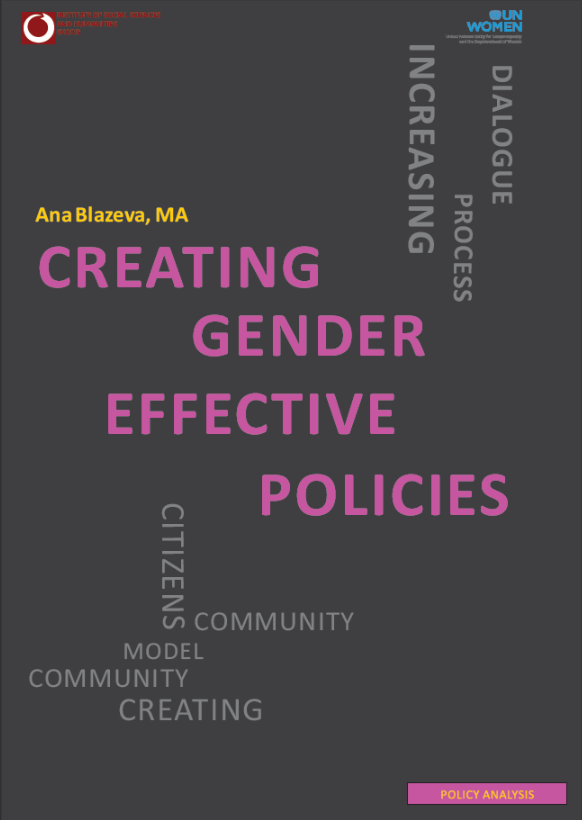
We kindly inform you that, as long as the subject affiliation of our 300.000+ articles is in progress, you might get unsufficient or no results on your third level or second level search. In this case, please broaden your search criteria.

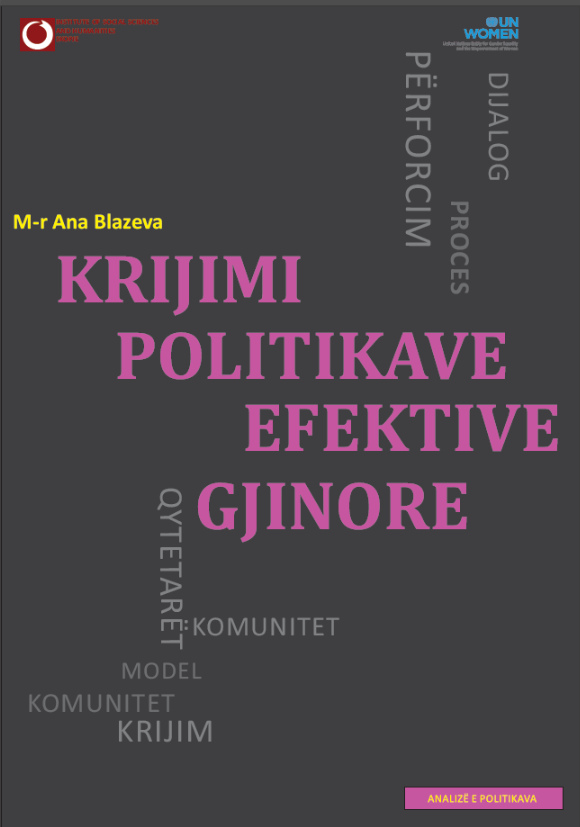
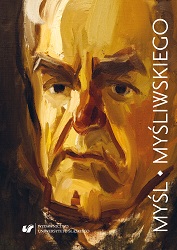
The collective monograph of the works of Wiesław Myśliwski is not the first attempt at a comprehensive conceptualization of the work of the author of „Nagi Sad”. It has been preceded by a series of “anniversary” books published by The Jan Kochanowski University in Kielce as well as monographs by e.g. Bogumiła Kaniewska. The uniqueness and purport of issuing another exhaustive formulation of Myśliwski’s work is justified by, first of all, the importance of this work, and, secondly, the fact that the authors have made an attempt to conceptualize it in a novel way. The book ends with the re-print of the essay by Myśliwski entitled „Kres kultury chłopskiej”, which on the one hand is a text that has been slightly forgotten, and on the other hand many authors of the monograph have made reference to the theses of this very essay. The studies and essays presented in the book attempt at interpreting the complete literary output of the author of „Widnokrąg”, his individual works or motifs from his writing. The most complementary attempt at reading Myśliwski in the volume has been offered by Józef Olejniczak, who in his essay treats the six novels published so far as chapters of an autobiographical project of the writer, and, in conclusion, poses a question about a continuation. It is followed by a study into the presence of WW II in Myśliwski’s work seen as a traumatic experience and at the same time as an attempt of asking definite questions about the role of Polish peasantry in the tragic history of this war. Artur Żywiołek, in turn, analyses „Widnokrąg” from the point of view of “new humanities” and “opens up” the reading of this significant novel for hitherto undescribed philosophical contexts. In a similar way we can characterize the attempt of Tomasz Bocheński – the researcher points out to the interpretative contexts which have not been accounted for so far in the studies on Myśliwski, like, for example, the musicalness of this prose. Wiesław Sedlak describes the authorial subject of Myśliwski as “nomadic”, pointing out to the fact that it is a subject that is in a permanent journey, wandering, walking, which constitutes a reconsideration of the previous convictions about the solely peasant provenance of Myśliwski’s work. Bogumiła Kaniewska and Karolina Wawer reach to Myśliwski’ images of women, assuming various perspectives from the domain of feminist literary criticism and gender studies. Krystian Węgrzynek in his essay is interested in the attitude of Myśliwski towards religion, Karol Maluszczak deals with objects in the worlds represented in the novel as the elements of the material memory of the writer, the “catalysts of his memory”. Piotr Zając writes about the presence of animals in this work, while Antoni Lesiak focuses his interpretation of „A Treatsie on Shelling Beans” on the music motif, on the job of saxophonist performed for many years by the narrator-protagonist, and Paweł Otręba attempts to interpret „Stone Upon Stone” in the light of the Sigmund Freud’s drive theory. Another study, by Wojciech Kuska, is an interpretative attempt at the conceptualization of a dendrologic motif in Myśliwski’s work in the light of the concept of the Linguistc Picture of the World. Jolanta Betkowska, by contrast, demonstrates how a modern media culture devastates the primal peasant culture, in this way commenting on the theses of the essay „Kres kultury chłopskiej” and its consequences present in the novels and dramas of the author of „Ostatnie Rozdanie”. The monograph concludes with three studies on the dramaturgic work of Myśliwski and the theatrical staging of his dramas and novels. Ewa Wąchocka presents an attempt at a comprehensive approach towards the problems, Anna Podstawka focuses on the theatrical adaptation of „Widnokrąg” made by Bogdan Tosza, while Jan Ciechowicz offers a summary of various ways in which Polish theatres have been fascinated by the works of Myśliwski and have adapted them for their own use. The monograph „The Musings of Myśliwski (essays and studies)” aims at presenting the work of Myśliwski in many different contexts, and it also aspires to demonstrate how this work radiates and “influences” on various creative activities of man, such as the theatre, film, music, and the fine arts, therefore the cover features the portrait of the writer painted by Stanisław Baja, and also inside the book there is a drawing of the artist, which is a sketch to the portrait of Wiesław Myśliwski.
More...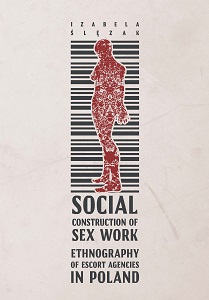
The book presents the social organization of escort agencies in Poland. The author focuses on analyzing the actions of female sex workers who are seen as active entities co-creating their working conditions. The author discusses the relationships between employees of the premises, namely the women providing sex services, the managers of the agencies and the security workers. Furthermore, she analyses the interactions between sex workers and their clients. The book is addressed to people who are interested in qualitative sociology, and those who would like to understand contemporary escort agencies in Poland. It will be also interesting for employees of organizations which work with people who provide sex services.
More...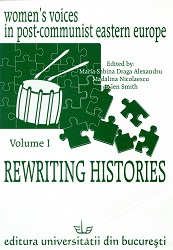
This volume springs partially from a wish to fill a gap in knowledge: Eastern and Central European countries know little about each other’s literatures. School curricula in the region include ‘the world classics’ but, with few exceptions, fail to refer to literature produced in the neighbouring countries. If we adopt a wide definition o f w hat E astern Europe means (which this volume does), there is one important exception to this rule: the presence of classic Russian literature by authors of indisputable fame such as Tolstoy, Pushkin and Dostoevsky. Promoted by political dogma that was initially shaped by the dictates of Soviet Russia and hence generally favourable to all things Russian, the Russian classics w ere widely read in communist governed countries. There are also discrete exceptions from the literatures of other countries - Mickiewicz, Sienkiewicz, Kafka, and Hasek for example - however the reading audience can seldom place such works within an appropriate frame of reference, that is, within the social and literary histories from which they emerged. The reason is ignorance, not always of the works, but of the context around them. This can be attributed to the isolation of national cultures which was encouraged by the communist regime in some countries in the region, and a levelling of differences within the all-inclusive universalist discourse of communism itself.
More...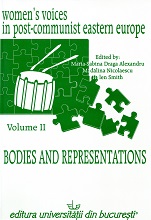
This volume is the second o f a collection of critical essays on Eastern European women’s literature after the fall of the communist regime. The first volume, Rewriting Histories, published last year, focuses on the need to retrieve personal perceptions of the history of women’s experiences under communism and tries to bridge the gap between a now and a then whose memory is still felt as traumatic. The essays in the current volume, whilst still deeply marked by this historical dimension, open up the perspective to a wider variety of issues by focusing more on representations of body-related experiences. A special emphasis is placed on the body as a site of knowledge-formation and of liberation from and resistance to patriarchal norm in its relation to communism. A characteristic of most essays is their focus on local interpretations and close readings, whilst theory is given comparatively less weight. The lack of an Eastern European-specific feminist theory and the rather indiscriminate borrowing of theories coming from Western Europe and the United States, which often did not match realities in the region, was the cause of much lament for feminism in Eastern Europe in the early post-communist years. More recently, as these essays suggest, attention to the local, to the mechanisms of texts in their relationships with contexts and an urge to historicise experience seem to have left the older propensity for theoretical discourse behind.The essays in this volume examine this local dimension through focusing on embodied knowledge production and representations of the female self in a comparative perspective, which reads contemporary experience against the background of the still present traumatic memory of the communist regime. Whilst trauma must be overcome so that historical evolution may be possible, such evolution cannot take place unless the negative experiences of the communist years are articulated and owned.
More...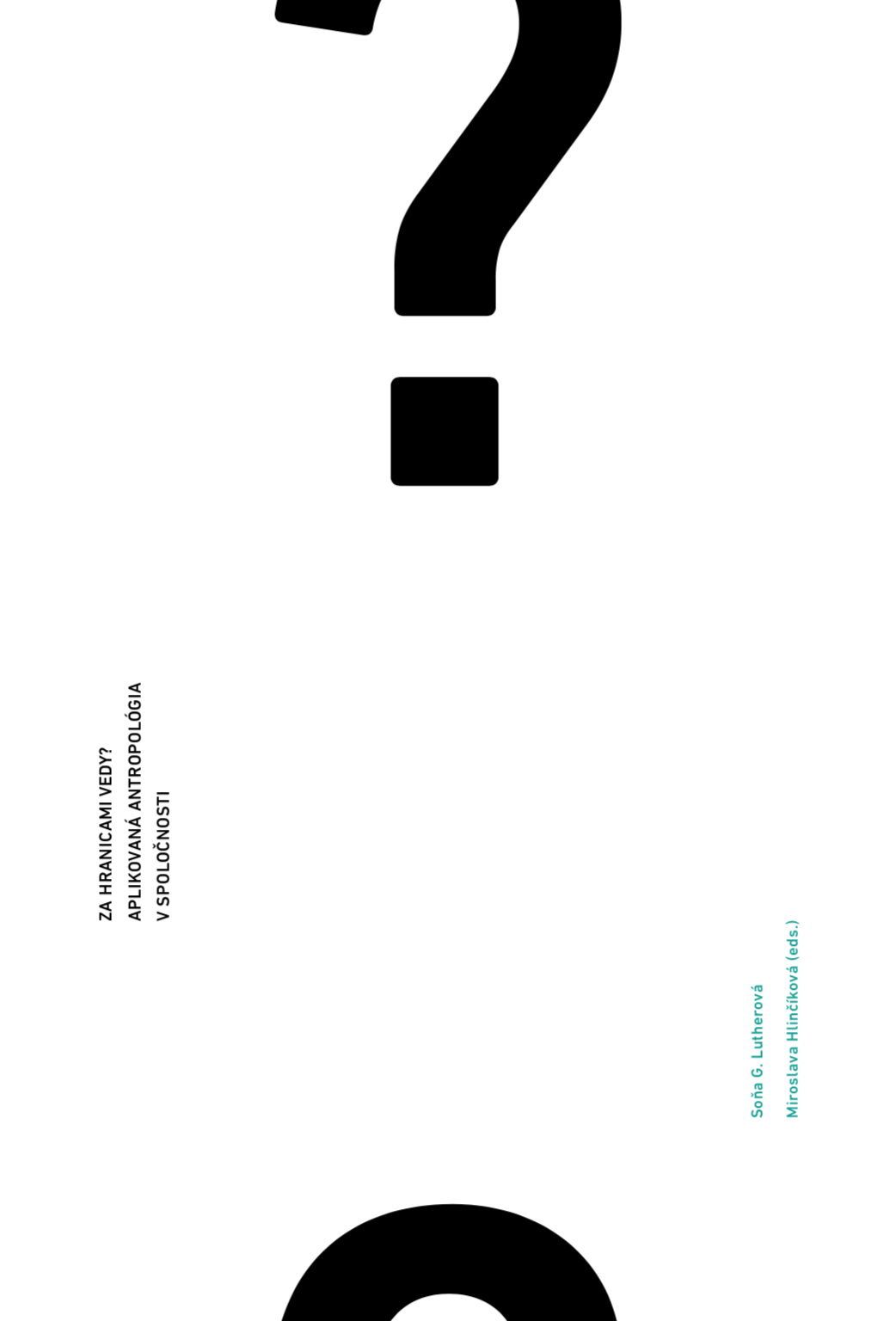
V poslednej dobe sa v spoločenskom diskurze na Slovensku či už v mediach, alebo na socialnych sieťach veľa hovori o vyzname a (ne)užitočnosti socialnych vied. Praca spoločenskych vedcov a vedkyňsa pritom mnohym javi ako ťažko pochopiteľna a uchopiteľna. Prečo niekto skuma javy, temy, suvislosti, ktore ľudia žiju vo svojich každodennych životoch, a teda im predsa rozumeju bez toho, aby ich zbytočne intelektualizovali, analyzovali – skratka a dobre – komplikovali? Alebo naopak – načo niektore problemy tisickrat „rozpitvavať“, keď potom vysledky neprinesu ich jednoduche riešenie? Vedcom a vedkyniam sa ponuka možnosť viac sa „otvoriť“ svetu, objasniť verejnosti zmysel ich prace a to či už v ramci popularizačnych aktivit, alebo prostrednictvom bezprostrednej aplikacie nadobudnutych poznatkov v spoločenskej praxi. Socialna antropologia či etnologia su vedeckymi disciplinami o culture v širokom zmysle slova, respektive o kulture každodennosti. Ich ustrednym zaujmom a temou su ľudia a ich žita realita. Zaoberaju sa ich preživanim, socialnymi vzťahmi, materialnym prostredim, identitami a sposobom, akym su tieto vytvarane a ako sa odražaju na rozličnych urovniach ľudskej existencie. Socialni antropologovia a antropologičky sa v sučasnosti nesustredia len na klasicke temy, vzťahujuce sa k tradičnym prostrediam či spoločenstvam.
More...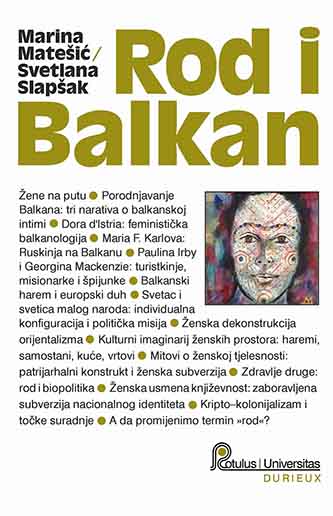
Marina Matešić's and Svetlana Slapšak's book Gender and Balkans incorporates two studies on gendering of Balkanism, i.e, on the gendered reading of Balkanism. In the forst part, the authors write about the historical practice of presenting the Balkans by male travelers only to contrast them with the travelogues by women authors of the 18th and 19th centuries, who broke down patriarchal representations of the Balkans. Analysing travelogues by Mary Wortley Montagu, Emily Strangford, Dora d’Istria, Jelena Dimitrijević, Maria Karlova, Paulina Irby and Georgina Mackenzie, Matešić and Slapšak infer that their protofeminist role frequently went hand in hand with their imperialist tendencies. The second study is about the gender situation in the 20th century Balkans. It questions the concept of gender, its appropriation for various arbitrary theses, and its subsequent contamination. The authors also indicate that the notion of mobility is politically marked. Svetlana Slapšak was born in 1948, in Belgrade, where she graduated in classical philology at the Faculty of Philology. Her PhD thesis was on the Vuk Karadžić's dictionary and calcs from Greek language. Slapšak worked at the Institute for Literature and Arts in Belgrade, and from 1986, she has been a professor at the Faculty of Arts in Ljubljana. She has published more than 50 books, and 400 scientific papers in anthropology, gender studies, Balkanology, and feminist criticism. She translated numerous books from latin, old Greek, French and English into Serbian language. For her work she was awarded several literary and peace awards. Marina Matešić was born in Split. She graduated in philosophy, literature and gender studies, and obtained her PhD with the thesis on gender anthropology at the Institutum Studiorum Humanitatis in Ljubljana. She won scholarships as a guest researcher at the Duke University in the USA, and the Humboldt–Universität in Berlin. Her areas of interest are the construction of gender and sexuality, cultural identities and migrations, feminism, Balkanology and postcolonialist criticism.
More...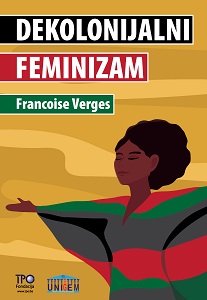
Polazeći od pitanja „Ko čisti svijet?“, ova knjiga ispituje feminističke borbe u kontekstu nasilne i brutalne kontrarevolucije. Ovo pitanje potaknulo je štrajk crnih i smeđih žena koje čiste željezničku stanicu Gare du Nord u Parizu. Nije to bio prvi štrajk te vrste, niti prvi put da smo vidjeli rasijalizaciju i feminizaciju slabo plaćene i potcijenjene djelatnosti čišćenja i skrbi, niti da se raspravljalo o ulozi društvene reprodukcije u kapitalizmu. Ipak, taj je štrajk ponukao da se čišćenje sagleda u kontekstu pokreta #MeToo, Black Lives Matter, javne osude policijskog nasilja i femicida, masovnih feminističkih demonstracija i štrajkova, posebno u zemljama južne hemisfere, ali i u kontekstu feminističkog rasizma, imperijalizma, militarističkog nasilja kao rješenja društvenih problema i rasnog kapitalizma. Od tada je pandemija virusa Covid-19 pokazala da je „proizvodnja [...] grupno diferencirane osjetljivosti na preranu smrt“ konstanta rasnog kapitalizma. Pandemija je otkrila duboke nejednakosti i nepravde u pristupu zdravstvenim uslugama – da pravo na disanje nije univerzalno – te nimalo iznenađujuću, ali ipak uzrujavajuću činjenicu, da je stopa smrtnosti veća među crnačkim, starosjedilačkim, smeđim i siromašnim zajednicama, onim koji nose težinu izgubljenih poslova i povećanog siromaštva dok milijarderi postaju sve bogatiji. Rječnikom „rata“ opravdavalo se slanje nezaštićenih radnika na „bitne“ poslove na „prvoj liniji fronta“. I na koncu, pokazala je da stvaranje sigurnog i čistog svijeta za nekolicinu počiva na iskorištavanju i izvlaštenju mnogih, da ekstrakcija ostaje logika kulturnog i ekonomskog imperijalizma i da je podjela između života koji su važni i života koji nisu važni – linija koja se neprestano iscrtava – i dalje snažna. Upravo u tim konkretnim borbama učvršćujem dekolonijalni feminizam, u želji da razbijem seksizam, rasizam, kapitalizam i imperijalizam, i da „sve promijenim“, kako kaže Veronica Gago.
More...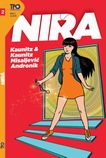
TPO Fondacija je tokom 2015. godine, u okviru projekta „Inicijativa za kreativni dijalog i edukaciju (IKDE)“, počela s radom na drugom izdanju stripa „NIRA“. Radeći s učenicima i učenicama srednjih škola kroz radionice koje uključuju teme o građanskom aktivizmu, angažiranoj umjetnosti, ljudskim pravima te radi potrebe za nastavkom učenja o vlastitim pravima i obavezama u zajednici u kojoj živimo, TPO Fondacija je pokrenula publiciranje novih priča o junakinji Niri u drugoj ediciji istoimenog stripa. Novih pet epizoda stripa „NIRA“ držat će vašu pozornost i potaknuti vas na razmišljanje o vašem vlastitom djelovanju u zajednici u kojoj živite. Učeći da ne smijemo biti slijepi pred nepravdom, „NIRA“ će nas ponukati da preispitamo vlastitu odgovornost prema sebi i drugima.
More...
U okviru projekta „Inicijativa za kreativni dijalog i edukaciju (IKDE)“, TPO Fondacija je pokrenula publiciranje stripa „NIRA“ kako bi ljudska prava približila mladim ljudima, posebno tinejdžerima. Vodeći se idejom da mladi ljudi trebaju biti nositelji promjena u društvu kroz različite aktivnosti, TPO Fondacija je kreirala poseban materijal koji će ih na primjeren način potaknuti da artikuliraju pitanja ljudskih prava u svom okruženju. Strip „NIRA“ kao izražajna forma, koja komunicira različite poruke ispreplitanjem slike i riječi o ljudskim pravima i njihovoj primjeni, potiče mlade da uče, promišljaju i rade, te na taj način spajaju kreativnost i građanski aktivizam. Junakinja ovog stripa, Nira, na autentičan način predstavlja jedan od modela angažirane mlade osobe i osviještene građanke koja vlastitim primjerom svakodnevno pokazuje hrabrost i inicijativu za promjene u društvu. Ona je svjesna poteškoća s kojima se susreće društvo u kojem živi, ali se opire pasivnom, inertnom i jednoličnom društvu koje svojom šutnjom i neaktivizmom dopušta kršenje ljudskih prava. Ustrajna je u svojim ciljevima, podiže svoj glas i pokreće se, ne dopuštajući da pred mojim očima vlada nepravda i bezakonje. Svojim idejama, željama i aktivizmom pridobiva podršku svojih prijatelja/ica te uspijeva promijeniti stavove okoline.
More...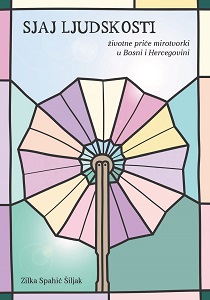
Shining Humanity: Life Stories of Women Peace Builders in Bosnia and Herzegovina is a collection of biographies of eleven local peace leaders from varying ethnic, religious, and non-religious backgrounds. As these stories begin to illuminate the women’s deep faith in humanity, they can help to teach us how to become fully human beings in difficult wartime and postwar situations. The women selected for inclusion in this book showed genuine humanity (ljudskost) in the darkness of war and suffering but dared to imagine a life beyond the imposed boundaries of violence and fear. The goal of this book is to shed light on the women’s side of peace work and on women’s efforts to (re)build, to heal, to reconcile, to empower, and to embrace all the challenges and complexities of the post-war Bosnian realm. These women hope to teach the next generation that each and every person has the capacity to do something good, and for this to happen young people need only have faith that it is indeed possible to change things for the better. The author examines how moral imagination functioned in the lives of women peace builders as they proceeded to make progress in their efforts to bring peace to their communities; she looks for the social history of Bosnia and Herzegovina, its special dynamics, values, and norms; she discusses the role of religion in peacebuilding in an overwhelmingly de-secularized society, and finally she highlights in the women’s stories the achievements of ordinary women who made extraordinary journeys. This analytical account of the life stories of Bosnian women peace builders provides valuable anthropological material from the local Bosnian context, material that can offer guidance for other regional and even global peace builders. Readers will learn that peacebuilding in BiH was motivated by the concepts of both care ethics and feminist ethics of justice and compassion, as well as the surviving socialist ethics of unity and equality, and by the universal human rights norms codified in the legal system of BiH. Most of the peace builders in this book are religious, but their religion came into play only later as one of many equally important and relevant rationales for their peace work. These stories do not present an idealized image of women or of perfect peace activists, but rather they tell the tale of ordinary women who bore witness to horror but chose to live in hope.
More...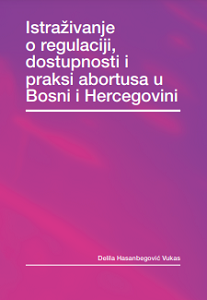
U ovoj publikaciji predstavljamo i analiziramo pravnu regulaciju, dostupnost, pristupe i prakse abortusa u Bosni i Hercegovini. U prvom dijelu predstavljamo i analiziramo međunarodni i domaći pravni okvir koji regulira pitanje abortusa i seksualnih i reproduktivnih prava u širem smislu, s ciljem mapiranja pozitivne (važeće) regulative u ovoj oblasti, identificiranja nedostataka i prostora za unapređenje. Dakle, prvi dio izvještaja uključuje: – analizu međunarodnih dokumenata koji tretiraju seksualna i reproduktivna prava i zdravlje i – analizu zakonodavstva BiH (Federacija BiH, Republika Srpska, Brčko distrikt BiH) iz oblasti zdravstvene zaštite, reproduktivnog zdravlja, specifično abortusa, vođenja statističkih pokazatelja i finansiranja usluga u oblasti zdravstvenog osiguranja. U drugom dijelu predstavljamo i analiziramo prakse zdravstvenih institucija i ustanova u oblastima priznanja, uživanja i ostvarivanja prava na abortus iz perspektive dostupnosti i pristupa uslugama abortusa. Također, predstavljamo i analiziramo iskustva žena iz BiH koje su imale iskustvo abortusa. U konačnici izvještaj predstavlja rezultate/zaključke istraživanja dostupnosti abortusa, te razvija preporuke za unapređenje pristupa abortusu u BiH proizašle iz nalaza do kojih se istraživanjem došlo.
More...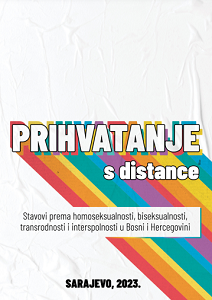
Ovo istraživanje za cilj je imalo osigurati duboko razumijevanje položaja LGBTI osoba u BiH i faktora koji oblikuju njihovu svakodnevicu, te dati uvid u mnijenje i ponuditi razumijevanje stavova i mišljenja opće populacije u Bosni i Hercegovini prema LGBTI osobama, njihovim pravima i slobodama te LGBTIQ aktivizmu. Kroz odabrani reprezentativni uzorak od 1023 ispitanika/ce u dobi od 18 do 65 godina, istraživanje je ispitalo nivo svijesti i podrške prema LGBTI osobama i njihovim ljudskim pravima. Metodološki pristup uključivao je online anketiranje putem platforme CAWI te analizu kroz deskriptivnu statistiku i odnose između demografskih varijabli. Rezultati istraživanja ukazuju na pozitivan trend u poznavanju LGBTI tema i osoba u bližem okruženju te promjene u stavovima opće populacije. Ključni nalazi predstavljeni su ispod…
More...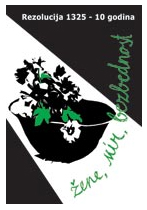
The UN Security Council adopted Resolution 1325 ‘Women, Peace and Security’ on October 31st, 2000. It is the first time that the UN Security Council advocates at such a high level the inclusion of women in peace processes and implementation of peace agreements. As for Serbia, ten years after the adoption of SC Resolution 1325 not only that state institutions did nothing in terms of implementation R1325, but they remained deaf on permanent and long-term efforts of civil society organisations to implement the Resolution. Women in Black, starting from 2005, have been demanding the implementation of SC Resolution 1325 and the adoption of Women in Black’s Resolution ‘Women, Peace and Security’, with the requirements specific for political context in Serbia. In fact, we had the support of dozens of civil society organisations, and also of several MP’s in the Parliament of Serbia. Unfortunately, our requests were not included in the agenda of the parliamentary sessions, which testifies to the extremely scarce democratic capacity and lack of political will of the current institutions in Serbia to acknowledge initiatives and efforts of autonomous civil society organisations in Serbia and of their failure to comply with international obligations. Out of very pragmatic reasons of adoption of international documents, in early 2010, the institutions of the Serbian state began the drafting process of NAP for the implementation of Resolution 1325. Activists around the world have been giving us early warnings of the danger of bureaucratization of R1325 by States, even by some NGOs; that happened in Serbia - Resolution 1325 has been misused by the ruling elite and some NGOs, in order to achieve certain political goals. NAP drafting process testifies to the absence of autonomous civil society organisations from the process; it also testifies to the fact that the state representatives do not acknowledge lasting efforts and initiatives of civil society organisations to educate, promote, and lobby for the implementation of SC Resolution 1325 in Serbia. The whole drafting process of NAP in Serbia was non-transparent, undemocratic and non-inclusive, which is proven by the results of a research survey, prepared by Women in Black, along with other numerous activities, in order to commemorate the tenth anniversary of the SC R1325. Complete report about cited research survey shall be given later in this publication. The state of Serbia will adopt the NAP for the Implementation of the SC Resolution 1325 in order to meet yet another formal request by the international community and Women in Black will, with the support of related autonomous civil society organisations, monitor the implementation of the Resolution 1325 and will notify all relevant local and international institutions about the process.
More...
This book, an anthology of women’s records about the wars waged on the soil of the former Yugoslavia in 1991-1999, is the product of a yearlong exploration in cooperation with many women’s organizations, human rights organizations, organizations which deal with the past and reconciliation, and the individual women who bravely voiced their experiences, recorded their experiences and/or endorsed these experiences. We made our selections from the sources within our reach. The available sources are listed in the Bibliography. We hope that this book will not remain the only one of its kind and that it will encourage further research and more books. With the exception of some inevitable abridgements marked (…), we have reproduced all of the texts faithfully.
More...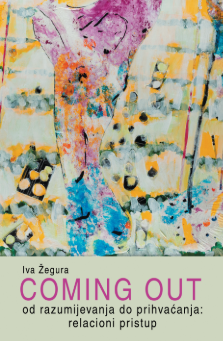
Pisanje knjige neobičan je proces različite dinamike. Traži dosta vremena, kapacitet za kreativnost i slobodu razmišljanja i asocijacija, no isto tako dobar fokus. Knjiga ne nastaje samo u tom vremenu izdvojenom za pisanje. Ideje i koncept knjige stvaraju se mnogo ranije, kroz mnogobrojna iskustva, realcije, interakcije. Sve to nije moguće bez pravih osoba na pravome mjestu i odgovarajuće podrške. I, premda zahvale na početku knjiga često izgledaju kao klišej, koristim ovu priliku da zahvalim svima koji su se našli na mom osobnom i profesionalnom putu te doprinijeli nastanku drugog izdanja “Coming outa”. Od obitelji, bez obzira na njezinu strukturu, sve kreće. Imala sam privilegij biti podržana u svojim osobnim i profesionalnim aspiracijama i zato želim zahvaliti roditeljima, baki, sestri, nećaku i Mari. Na profesionalnom putu tu su svakako bili moji profesori i profesorice koji su me poticali na kreativnost, kritičnost i znanstveno propitivanje te bili neiscrpan izvor za razvoj kompetencija, ali i za osoban razvoj. Sasvim sigurno ću nekoga izostaviti, no željela bih zahvaliti Ani Boban Lipić koja mi je otvorila vrata psihologije. Profesoru i prijatelju Kruni Zakariji koji je preko svoje naklade KruZak preuzeo prvo izdanje “Coming outa” nakon zatvaranja nakladničke kuće MD. Mojim profesoricama i profesorima s Odsjeka za psihologiju Filozofskog fakulteta u Zagrebu. Ireni Bezić, Jasenki Pregrad i Biserki Koren koje su me pratile na putu razvoja u području psihoterapije. Posebno hvala profesorici Peggy Cohen-Kettenis od koje sam naučila mnogo o skrbi za transrodne osobe Hvala recenzentu Aleksandru Štulhoferu koji je dao važne sugestije kod prvog izdanja knjige i ovog drugog. Hvala recenzentici prvog izdanja Maji Mamuli. Veliko hvala novim recenzenticama, kolegicama Jeleni Vidić i Marini Nekić koje su svojim konstruktivnim komentarima učinile ovo drugo izdanje “Coming outa” kvalitetnijim. Zahvaljujem sociologinji Lei Jurišić autorici pogovora prvom izdanju te kliničkoj psihologinji i psihoterapeutkinji Belmi Žigi koja je napisala pogovor drugom izdanju Coming outa. Hvala Jasminki Jelčić na strpljivom slušanju, savjetima i bistrenjima što našem društvu i profesiji treba kako bismo znali bolje odgovoriti na mnoga pitanja i kontroverze koje se pojavljuju kod tema seksualnosti, seksualnih orijentacija i rodnih identiteta. Naše diskusije pomogle su i mom osobnom sazrijevanju i kompetencijama govorništva te se nadam da sam upravo u našim šetnjama i raspravama izoštrila sposobnost usredotočenja i sažimanja poruke koju mi je cilj bio prenijeti čitateljstvu. Hvala Upravi Klinike za psihijatriju Vrapče na potpori i ulaganju u moj profesionalni rast te stvaranju mogućnosti da stečena znanja prenesem kolegama i kolegicama različitih profesija ovdje, u Hrvatskoj, regiji i mnogo šire. Želim zahvaliti mojim kolegama i kolegicama iz EPATH-a, WPATH-a, EFPA-e i Bord on Cultural and Ethnic Diversityj, IPsyNet APA, SFU Vienna, Global Network of Psychologists for Human Rights, Hrvatskog psihološkog društva i Hrvatske psihološke komoreza priliku zajedničkog profesionalnog rasta kroz kongrese, konferencije, sastanke, edukacije, diskusije i prijateljstvo. Ako ih krenem poimence nabrajati sigurno ću nekoga izostaviti i zbog toga samo mogu napisati – drage kolege, dragi prijatelji, sjajni ste! Centralni dio čine osobne priče LGBTAIQ+ osoba i roditelja LGBTAIQ+ djece o procesu coming outa. Ove osobne ispovijesti o vlastitom osvještavanju seksualne orijentacije i rodnih identiteta, coming outu, kao i o osvještavanju rodnih identiteta i seksualnih orijentacija djece te obostranom procesu razumijevanja i prihvatanja knjigu čine životnijom. Hvala svima koji ste mi poslali svoja osobna iskustva i dopustili da ih objavim! Ovo drugo izdanje posebno su obogatili svojim profesionalnim razmišljanjima i iskustvima moje kolege i kolegice različitih struka u području zaštite zdravlja i mentalnog zdravlja. Hvala vam Jadranka Hübler, Vedrane Korušiću, Petra Goršić, Mihalele Kozina, Snježana Božić, Andrea Jambrošić Sakoman, Nina Bašić Marković i Tina Dušek, uslijed vašeg doprinosa ova je knjiga suvremenija, sveobuhvatnija i primjenjivija! Hvala i svima onima koji su na različite načine tijekom ovih godina kritizirali, propitivali, napadali, diskreditirali i ruminirali o mom profesionalnom djelovanju i kompetencijama zbog puke činjenice mog osobnog identiteta i tema kojima se bavim. Često sam sa čuđenjem doživljavala riječi pokojnog ravnatelja prof. Jukića: “Otvorite oči i uši širom! Učite i od onih koji rade pogrešno! Od njih možete mnogo naučiti!” Što se to može naučiti od osoba koje rade pogrešno, bilo mi je strano. Apsolutna enigma. Profesorove riječi shvatila sam mnogo kasnije. Svi oni koji su mi se našli na osobnom i profesionalnom putu, a koji su činili pogrešno, mnogo su mi pomogli. Prvo, uštedjeli su mi vremena samom činjenicom što mi je postalo jasno na što ne trošiti energiju, što nisu moji izbori. I upravo zato, hvala vam, bili ste mi zoran primjer za učenje toga kako ne raditi i što ne činiti na toliko mnogo razina: od kolegijalnog odnosa, odnosa stručnjak-pacijent, profesor-student, nastupa stručnjaka u javnosti, pa do odnosa stručnjaka prema pojedincima u društvu i različitim oblicima djelovanja u društvu. Učinili ste da pomnije biram edukacije, mjesta i načine suradnje, profesionalne podrške i supervizije, izvore znanstvenih radova i činjenica, da više puta promislim svoje djelovanje u praksi, javnim nastupima i znanstvenom radu te da svaka moja izrečena i napisana riječ bude preciznija, točnija, etičnija i znanstveno meritornija. I na kraju, želim zahvaliti cijelom timu Sarajevskog otvorenog centra, a posebno Mateju Vrebcu, Delili Hasanbegović i Emini Bošnjak na višegodišnjoj izvanrednoj suradnji i prilici da “Coming out” doživi novo izdanje. Nadam se mnogobrojnim zajedničkim projektima i prilici da kroz zajednički rad doprinesemo našim profesijama i društvu u kojem živimo.
More...
Parents are the key in sport development. The roles that parents develop in sport with their children, either in a leisure or competitive way, are complex and varied. However, the literature that makes a distinction between the father and the mother is very limited. This book has expected, therefore, to contribute to know much better the mothers´ role in that sport development. Her presence has always been obscured by the male perception of the sport activity. To give the mothers voice and presence has been the main goal of this book. Mum, thanks! Is an appreciation to the work that many mothers have carried out and they still do, to favor that their elite sport athletes face the sport in the healthiest possible way.
More...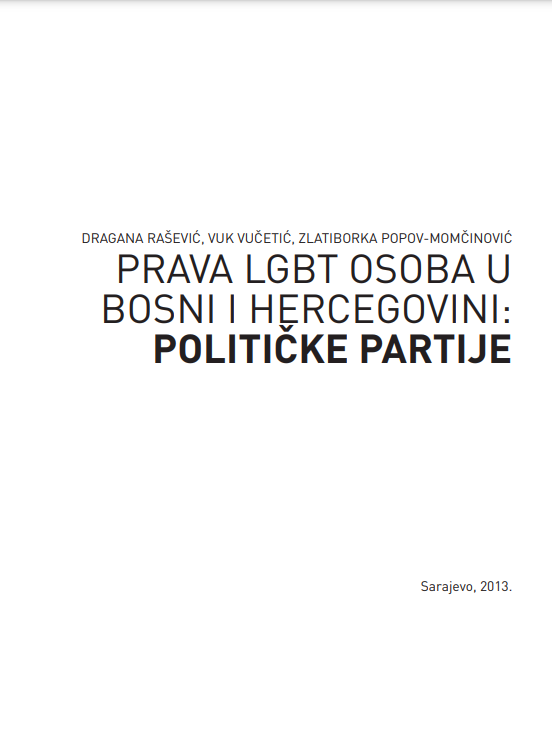
Četvrta studija sprovedena u okviru sektoralnih istraživanja projekta Coming out! Zagovaranje i zaštita prava LGBT osoba koja je pred nama urađena je s ciljem sticanja dubljeg uvida u vizure, objašnjenja i aktivnosti kada političke partije BiH adresiraju, tačnije (usput) dolaze u dodir sa ovom temom. Ne može se govoriti o adresiranju budući da je sama problematika na samom dnu ljestvice idejno-ideoloških i praktičkih aktivnosti ogromne većine ovdašnjih političkih partija, kao i društva u cjelini.
More...
In relation to the different logics of breaking dominance, this book deals with Bourdieu's approach to the political field, the field of education, the scientific field, the field of art and the field of power. In particular, Bourdieu's view of male dominance was discussed, which, according to the French sociologist, represents a kind of "transversal" of all fields. The mentioned social fields have been singled out because Bourdieu dedicated one or more books to them, and because the exhaustiveness and systematicity of the analyzes contained in them make it possible to compare the fields and shed light on their specificities in terms of dominance.
More...